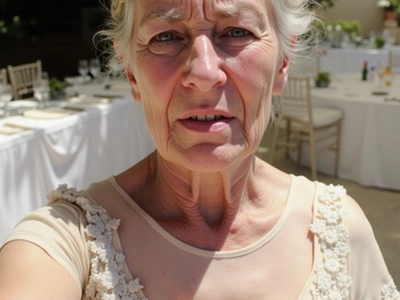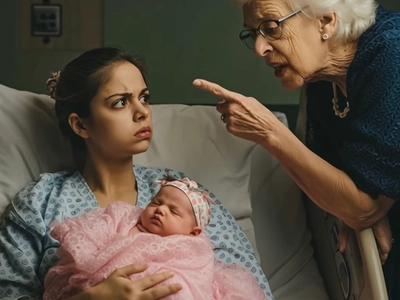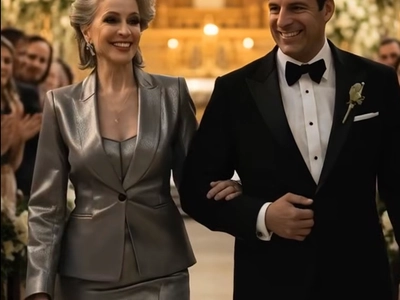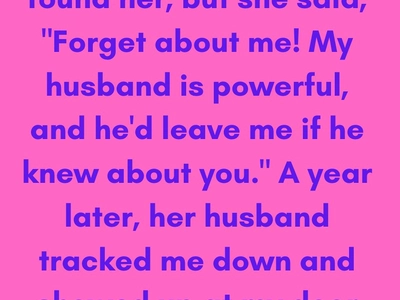I Raised My Daughter Alone, but at Her Wedding the Groom’s Family Left a Sign on My Table
I always believed my daughter’s wedding would be the proudest day of my life. For years, I had imagined sitting in the front row, my heart bursting with joy, watching her walk down the aisle. I had pictured her smiling, her eyes full of love, her happiness shining for everyone to see. I thought it would be my reward for all the sacrifices I made — the sleepless nights, the double shifts, the empty stomachs when there wasn’t enough food for both of us. I thought it would finally feel worth it.
When Emily was born, I was twenty-three and terrified. Her father, Tom, wasn’t ready for the responsibility. At first, he said he’d try, but by the time she was six months old, he was gone. He left with a short note and a box of his things, and that was it. I remember sitting on the floor that night, holding my baby and crying until my eyes burned. I didn’t know how I was going to make it, but when she reached for my face with her tiny fingers, I knew I had to.
The loneliness was brutal. I had no family to help me; both of my parents were gone, and Tom’s family wanted nothing to do with me after he left. But Emily became my world. Her laugh was my fuel. Every milestone — her first step, her first word, her first day of school — reminded me that I was doing something right, even if it didn’t always feel like it.
I worked as a nurse’s assistant for years, barely scraping by. There were times when bills piled up and food ran low, but I always found a way. When Emily wanted piano lessons in middle school, I cleaned a retired music teacher’s house in exchange for them. When she wanted to go on her class trip to Washington, D.C., I worked extra shifts until I could pay for it. When she got accepted to an out-of-state college, I emptied my tiny savings account without a second thought.
It wasn’t about giving her a perfect life. It was about giving her a chance — a chance to grow up without limits, to dream big, to never feel trapped the way I once did.
So when she called me during her junior year of college to tell me she’d met someone special, I was thrilled for her. His name was Michael. He was studying business, polite and respectful, always saying “yes, ma’am” and helping with the dishes when he came over. I could see how happy he made her, and that was enough for me.
But then I met his family.
From the first handshake, I could tell they looked at me differently. His mother, Cynthia, was elegant and sharp, with the kind of confidence that comes from never worrying about money. His father, Richard, was quiet and formal, the kind of man who probably checked the price tag on everything — including people. Their home was something out of a magazine, full of marble and expensive art. I showed up in a thrift store dress and tried my best to fit in, but I could feel Cynthia’s eyes on me, evaluating, judging.
She smiled, but it didn’t reach her eyes. She asked polite questions — where I worked, what I did for fun, whether I traveled much. Her tone made it clear that all my answers were disappointing. Richard stayed mostly silent, offering the occasional nod, as though being in my presence was a chore.
I tried, though. I brought homemade pies to family dinners, complimented Cynthia’s art gallery, offered to help with wedding plans when the engagement was announced. Every effort I made was met with that same thin smile. Once, at an engagement dinner, I overheard her whisper to a friend, “Single mothers always act like heroes. They love the attention.” I pretended not to hear, but my heart ached.
When Emily told me she wanted a big wedding, I was nervous but excited. I couldn’t afford to contribute much, but I offered to buy her dress. She told me Michael’s parents were covering most of the costs. I didn’t argue — I knew she wanted her dream day, and if they could provide it, I wouldn’t stand in the way.
But slowly, I began to notice things.
The wedding planner copied Cynthia on every email but rarely included me. Every decision seemed to go through Michael’s family — the flowers, the menu, even the guest list. When I asked Emily about it, she brushed it off. “Mom, they just like to be involved. Don’t take it personally.”
I tried not to. I told myself that as long as my daughter was happy, that was all that mattered. Still, it hurt. I’d spent my life being her whole world, and now, I felt like an afterthought in hers.
The morning of the wedding, I woke before sunrise. My heart raced with nerves, excitement, and a little sadness. I put on the light blue dress I’d saved up for and went to a small salon to have my hair done. When I looked in the mirror afterward, I saw a woman who had fought hard for this moment — a woman who had earned her place in that front row.
The venue took my breath away. It was a beautiful vineyard, golden light spilling over rolling hills, rows of white chairs set up under a canopy of flowers. Guests laughed and clinked glasses as music played softly in the background. I looked around for my seat, expecting to be near the front. Instead, I found my name at a table halfway back.
I told myself it didn’t matter. I sat down, smoothing my dress, and smiled politely at the people around me. Then I saw it — a folded card sitting on my plate.
In bold, black letters, written large enough for anyone passing by to see, were the words: “Horrible and Fake Mom.”
My stomach dropped. For a moment, I thought it had to be a mistake, some cruel prank. My hands trembled as I picked it up, and I could feel eyes on me — guests whispering, trying to hide their curiosity. My face burned. I couldn’t breathe.
I scanned the room, desperate for Emily, but my eyes landed on Cynthia instead. She stood across the hall, her lips curved into the faintest smirk.
Something inside me snapped.
I stood up, clutching the card in my shaking hand, and made my way to the bridal suite. A bridesmaid tried to stop me, but one look at my face and she stepped aside.
When I entered the room, Emily was standing in front of a mirror, her veil shimmering in the light. She turned, startled. “Mom? What’s wrong?”
I held up the card. “What is this?”
Her face went pale. “Where did you—”
“It was on my seat,” I said, my voice breaking. “For everyone to see.”
“I didn’t—Mom, I swear I didn’t do this.”
Before I could answer, Cynthia appeared in the doorway, calm as ever. “Oh, that?” she said, her tone dripping with fake concern. “It was just a little joke. Don’t take it so seriously.”
“A joke?” I could barely control my voice. “You think humiliating me in front of all those people is funny? After everything I’ve done for my daughter?”
Emily turned to her mother-in-law, her eyes blazing. “Mother, how could you?”
Cynthia tilted her head, unbothered. “I was just being honest. Some people like to pretend they’re saints because they did what every mother is supposed to do. Paying bills, working hard — that’s not special. Real mothers teach grace, class, and restraint.”
Her words hit me like a punch. I couldn’t speak. Emily’s eyes filled with tears as she grabbed my hands. “Mom, please. Don’t let her ruin this. You’re my mother. Nothing will ever change that.”
I nodded, but inside, I felt hollow.
The ceremony was beautiful. Emily glowed as she walked down the aisle, Michael’s eyes full of love as he watched her approach. Everyone clapped and smiled, but I could feel the weight of the whispers behind me. I held my head high, blinking back tears. They weren’t going to see me break.
At the reception, I tried to enjoy myself. I danced with Emily, told her how proud I was, and smiled for the photos. But after dinner, I slipped away quietly. The laughter and music faded behind me as I walked to my car. As soon as I was alone, the tears came.
In the days that followed, I replayed everything over and over — Cynthia’s smirk, the whispers, the sting of that hateful note. I wondered if I should have stood up in front of everyone, demanded an apology, refused to be treated like dirt. But deep down, I knew that would have only fed her cruelty.
A week later, Emily showed up at my door. The moment I opened it, she threw her arms around me and started to cry.
“Mom, I’m so sorry,” she said between sobs. “I talked to Michael’s parents. They admitted it. They said it was just a joke, that they didn’t think you’d see it that way. I told them I’d never forgive them for humiliating you.”
I held her close, running my hand over her hair. “Sweetheart, it’s not your fault. You didn’t do this.”
She pulled back, her face fierce. “No, Mom. I should have seen it. I should have stopped them. I told Michael that if they ever speak about you like that again, we won’t see them anymore.”
Her words broke me and healed me all at once. I could see the guilt and love in her eyes, the same eyes I’d watched light up with laughter when she was a child.
“It’s okay,” I said softly. “You don’t need to fight for me. Just live your life. That’s all I ever wanted.”
But Emily shook her head. “No, Mom. I’m not going to let anyone make you feel less than who you are. You’re the strongest person I know. You’re the reason I am who I am.”
In that moment, something inside me shifted. For the first time since the wedding, I felt peace.
The weeks turned into months, and though Michael’s parents remained distant, Emily kept her promise. She invited me to holidays, called me every week, and made sure I knew I was part of her life. At family gatherings, when Cynthia tried her subtle jabs, Emily shut them down with quiet strength.
Eventually, I stopped feeling ashamed of what happened. The card, the whispers, the humiliation — they didn’t define me. They revealed something else instead: how far I’d come.
I wasn’t a “horrible and fake mom.” I was a mother who had loved fiercely, who had fought through loneliness and exhaustion, who had built a life out of nothing for her child. Cynthia could never understand that kind of love, because she’d never had to fight for it.
Sometimes, when I think about that day now, I don’t feel pain anymore. I feel pride. Pride in my daughter for standing up for me. Pride in myself for surviving everything that came before. Pride in knowing that no amount of money, status, or cruelty could erase the truth.
I was the mother who stayed. The one who worked through tears and fatigue, who showed up to every school play, every doctor’s visit, every heartbreak. I was the one who carried her through the storms.
And no one — not even the coldest in-laws in the world — could ever take that away.






